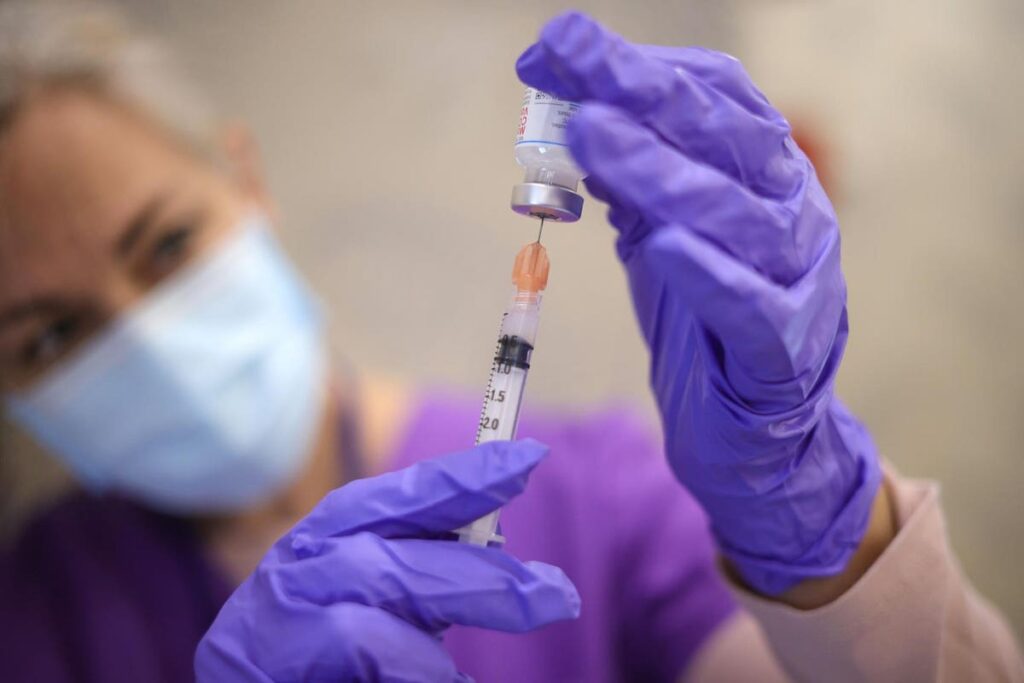BOWIE, MARYLAND – MARCH 25: Nurses draw Covid-19 vaccine doses from a vial (Photo by Win … [+]
Covid-19 cases are once again on the rise. The Centers for Disease Control and Prevention recently reported that Covid-19 related deaths were up 10.5% the first week in September. Likely driven by new variants that are more transmissible and able to evade prior immunity, rates are set to increase further as the nation heads into the fall and winter months. But on Monday, the Food and Drug Administration approved updated Covid-19 vaccines—manufactured by Pfizer and Moderna—that will help curb the spread of the virus and reduce significant complications associated with infection, including long Covid.
What’s Different About The Updated Vaccines?
As of May 2023, 81.4% of the U.S. population had received at least one dose of a Covid-19 vaccine. However, as new viral variants continue to emerge, it has become clear that annual, updated vaccines may be needed for the foreseeable future. This is not uncommon for RNA viruses—such as influenza and SARS-CoV-2—which are known to mutate and sidestep prior immunity.
In contrast to last fall’s booster that was designed to target both the original strain of SARS-CoV-2 and the omicron BA.4/5 variant, the latest mRNA vaccines are monovalent, meaning that they target a single variant (i.e, omicron XBB.1.5). The update is needed due to the large number of mutations that are present in recent omicron sublineages compared to the strains included in last year’s booster. It’s like the virus has put on a new disguise, allowing it to go unrecognized by antibodies that were produced to seek out and destroy a former version of SARS-CoV-2.
Despite XBB.1.5—the variant included in the updated vaccines—being overtaken this summer by other omicron variants, including EG.5 (Eris), XBB.1.6 (Arcturus) and BA.2.26 (Pirola), recent study data show the new vaccines to be effective at eliciting a strong immune response against the currently circulating strains.
Why Should You Get An Updated Covid-19 Vaccine?
The Covid-19 vaccines have been highly successful at reducing the rates of severe disease, hospitalization and death. But three-and-a-half years into the pandemic, we know that protective immunity is not long-lived. The immune system needs a periodic reminder to produce antibodies that are more specific to new strains of the virus. While immunity from prior infection or vaccination continues to prevent severe disease and death in many people, there are certain groups—including those over 65 years of age and the immunocompromised—who remain at higher risk. Receiving an updated vaccine will help reduce the chance of becoming infected and transmitting the virus to an at-risk individual. In addition, new data suggest that vaccination is associated with a lower risk of developing long Covid, which can impact all age groups, including those with an otherwise healthy immune system.
PRODUCTION – 07 February 2022, Rhineland-Palatinate, Bad Ems: Long Covid patient Sandra Greco takes … [+]
What Is Long Covid?
Long Covid, also referred to as Post-Covid Conditions or long-haul Covid, can occur in anyone following an acute infection with the virus. Those who have had severe disease, are unvaccinated, or experienced multiple infections are at higher risk of developing long Covid. Often defined as the persistence of symptoms for greater than 4 weeks after an acute infection, long Covid may last weeks, months or years. Although long Covid may involve a broad range of manifestations, the most common symptoms are severe fatigue, mental fog, fever, shortness of breath and a persistent cough. The CDC recently estimated that nearly 1 in 5 American adults who have had Covid-19 have persistent symptoms. Due to the often debilitating symptoms of long Covid, as many as 4 million people in the U.S. are believed to be out of work. Worldwide, an estimated 65 million people have long Covid. Unfortunately, there is currently no test for long Covid or specific treatment. The only way to prevent long Covid is to not be infected, which makes the updated vaccines an essential tool in our ongoing fight against Covid-19.
The new vaccines are expected to be available as early as this week, and are recommended for everyone 6 months of age and older. Potential side effects should be mild and similar to past Covid-19 vaccines, and may include soreness at the injection site, body aches, and a mild fever. The vaccines have been shown to be safe and effective, and can be taken alongside an annual flu shot.


